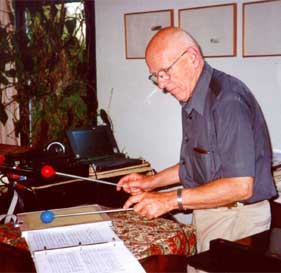Max Mathews
- Birthdate
- 1926/11/13
- Birthplace
- Columbus, NE, USA
- Death date
- 2011/04/21
- Associated organizations
- Bell Labs
- Fields of study
- Computing, Music
Biography
Electrical engineer Max Matthews is a pioneer in using computers to compose and perform music, and is considered one of the “fathers” of computer music.
Matthews was born 13 November 1926 in Columbus, Nebraska. After earning an undergraduate degree in electrical engineering at the California Institute of Technology, he earned a doctorate at MIT in 1954. Hired almost immediately by Bell Telephone Laboratories, he eventually rose through the ranks to become a director of the Behavioral and Acoustic Research Center. In the course of research in communication and digital signal processing, Matthews became interested in the possibility of using computers to make music. He wrote what was in all likelihood the first program for a computer music performance. Written in 1957 and called Music I, Matthews’ demonstrated the program that year using an IBM 704 computer to control an electronic synthesizer. Discussing his ideas in print, Matthews wrote that “[t]here are no theoretical limits to the performance of the computer as a source of musical sounds.” The excitement generated by Music I led to the creation of four subsequent versions of the program, each with new features and capabilities. He also became involved in speech processing and voice synthesis, and created the famous voice of “HAL” the computer, singing “Bicycle Built for Two” for the 1968 movie 2001: A Space Odyssey.
After 1974, Matthews supplemented his position at Bell Labs with a consulting position in Paris, France (Institute de Recherche et Coordination Acoustique/Musique). He retired from Bell Labs in 1985. In 1987 he accepted a position as a research professor of music at Stanford University. At Stanford, he has worked on projects ranging from a ‘pickup’ to allow an ordinary violin to be electronically amplified, and an advanced computer system for musical performances. Dr. Matthews is currently professor emeritus at Stanford and continues his research.
